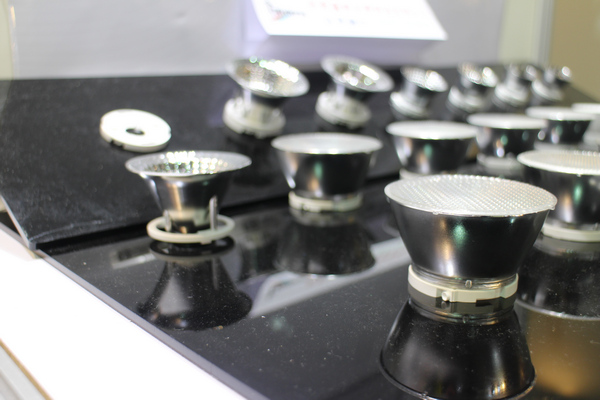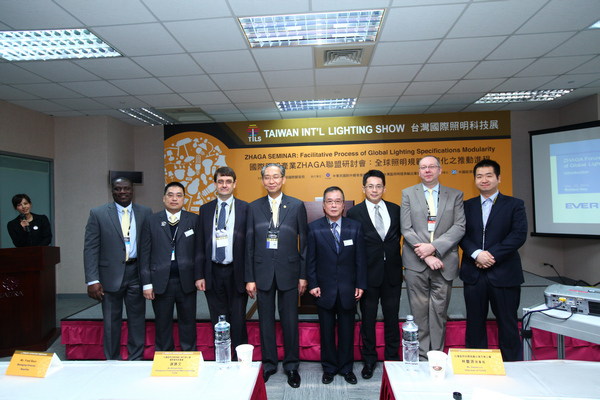Members of the Zhaga Consortium clarify some of the misconceptions of the Zhaga label during the recent “Zhaga Seminar: Facilitative Process of Global Lighting Specifications Modularity” at Taiwan International Lighting Show (TILS) 2014 at Taiwan World Trade Center (TWTC) Nangang Exhibition Hall in Taipei, Taiwan.
The formation of Zhaga, which takes its name from a waterfall in Sichuan, China, was based on the need for interchangeability in the rapidly developing LED industry. “The LED industry is almost like the mobile industry, you are getting new luminaire models out every month,” observed Fred Bass, Managing Director, Neonlite. The fast changing industry and rising need for retrofitting bulbs contribute to the need for standards in the industry.
A repeatedly emphasized point by members at the forum was the Zhaga logo only indicates interchangeability, specifically luminaire housing interchangeability and is not to be taken as an indicator of product quality, color performance, or luminaire efficiency. The fact that Zhaga focuses on mechanical interchangeability alone, has enabled it to quickly launch new standards. “There are other standards for product quality, and color performance,” said Bass.
 |
|
LED products that comply with Zhaga Book 3 for LED drivers and separated ECG displayed at Zhaga booth at TILS 2014. (LEDinside) |
Books in Zhaga language refer to specs of luminaire drivers or housing. The consortium has released eight books so far, and will be releasing Book 9 to Book 11 sometime next year, according to source familiar with the matter. “If you want to understand Zhaga terminology, please read through Book 1, which is like the Wikipedia of Zhaga,” commented Wu Zeng, Technical Project Leader, Philips. Wu also reminds those wanting to sign up that Zhaga specs are royalty-free.
As for future outlook of the consortium, it will be foacused mostly on forming mechanical and physical standards, and will not be moving towards smart lighting, said Bass. “Smart lighting uses a completely different chip and there are different standards that govern that,” remarked Bass.
Attending the lighting show for the first year, Zhaga Consortium which consists of 260 members aims to help introduce Taiwanese manufacturers to potential foreign markets, said a Zhaga staff. Although, the consortium has about 35 Taiwan manufactures, most of them remain associate members. Yet, only regular members, such as Epistar and Everlight can propose new Zhaga standards during meetings. Manufacturers remain reluctant to join because there has not been a market demand asking for Zhaga specificed products, explained Bass.
 |
|
Zhaga Consortium speakers attending “Zhaga Seminar: Facilitative Process of Global Lighting Specifications Modularity” from left to center: Joseph Frederic, Principal Engineer, UL, Michael Hsieh, Chairperson of International Affairs Committee, TLFEA (Photo Courtesy of TAITRA), Fred Bass, Managing Director, Neonlite, Chairman of TLFEA Steven Lin. Speakers from right to third right: Wu Zeng, Techincal Project Leader, Philips, Jurgen Sturm, Secretary General, Global Lighting Association, Hsu Hsi-chuan, Senior Director, Everlight. (Photo Courtesy of TAITRA) |
To encourage manufacturers to join Zhaga, a special offer of waiving specification fees for first year members from March to June, 2014, according to Joseph Frederic, Principal Engineer of UL. Associate members must pay a small fee for Zhaga certification. Companies that sign up for the special offer must display their Zhaga certified products at lighting shows, explained Frederic.
There are two UL standards that are suitable for Zhaga test certifications, including the 8754 standard. Companies hoping to get their products certified must send their products to a Zhaga certified lab, which includes UL, Dekra, and VDE Testing and Certification Institute. The certification results only mean the LED driver can fit mechanically and electronically, and actual certification is issued by Zhaga Consortium, said Federic.
(Author: Judy Lin, Chief Editor, LEDinside)





 CN
TW
EN
CN
TW
EN







